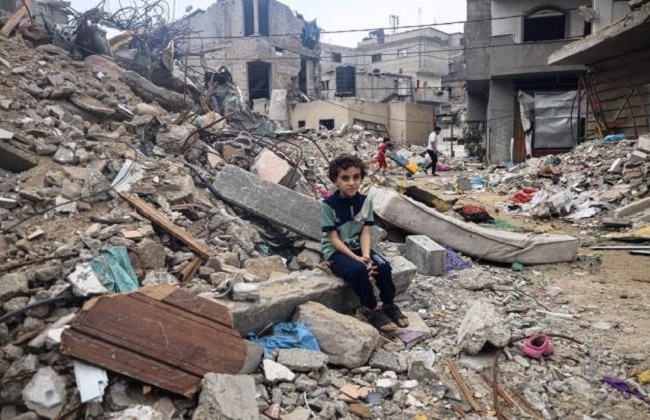
Israeli troops opened fire targeting the Palestinians, gathered around food aid trucks, killing at least 112 and injuring hundreds on 29 February. The massacre happened, about a month after the International Court of Justice (ICJ) ordered provisional measures for Israel to refrain from all acts under the Genocide convention. Ironically Israel was supposed to report to the Court, within one month, of all measures taken in line with its order. Israel has been emboldened by a beholden US.
Beholden US
The US rejected the South Africa’s genocide case against Israel before the ICJ as “counterproductive, meritless and without any evidence”. It continued to “believe that allegations of genocide are unfounded” even after the ICJ provisional orders and noted that the court did not call for a ceasefire.
President Joe Biden did not condemn the shootings, but said Washington was checking “two competing versions” of the killings. He only feared that the event would complicate the on-going efforts to broker a hostage exchange deal and a temporary so-called humanitarian pause. So, the US asked only for a clarification from the Israeli government while the rest of the world demanded an independent inquiry.
Unsurprisingly, Israel initially pinned “the blame on the crowd”, crushed and trampled in a stampede when aid trucks arrived; then the IDF inquiry found no wrongdoing by its soldiers “felt threatened” when hundreds of Palestinians approached them. It did not care to say how an army, equipped with most advanced weapons, could be threatened by hungry unarmed Palestinians, requiring indiscriminate firing.
Three days later, the US Vice-President, Kamala Harris, called for an immediate ceasefire. She called out Israel for not doing enough to ease a “humanitarian catastrophe”.
However, hypocritically, she ignored that it is her country that is allowing this to happen. The US repeatedly blocked all ceasefire attempts at the United Nations, continues to supply deadly weapons and unconditionally finance Israel’s war. It has urged the ICJ not to issue a ruling calling for Israel’s immediate withdrawal from the occupied Palestinian territories.
Worse, Kamala Harris now “urges” Hamas to accept a ceasefire deal even when Israel declined to send its negotiators to Cairo for the latest round of ceasefire talks, claiming without evidence that Hamas’s Gaza chief Yahya Sinwar has no intention of reaching an agreement and plans to escalate violence over Ramadan.
Hypocrisy galore
As the US provides diplomatic cover and signs blank cheques for Israel, Israel continues to block aid deliveries to Gaza. It knows very well that US calls for opening more entry points and accelerating aid deliveries are just lip-service.
The US and its Western allies were quick to defund the UNRWA, responding to unfounded Israeli allegations against it. This was despite repeated warnings by the United Nations and humanitarian organisations about the impending famine and on-going humanitarian disasters, and ICJ’s provisional order for all parties to take all measures to prevent plausible genocidal acts.
Having allowed this humanitarian catastrophe to occur, Harris now says, “People in Gaza are starving. The conditions are inhumane and our common humanity compels us to act”. This act now merely involves air dropping of food, simply a public relations move.
Dave Harden, former USAID director to the West Bank, told Al Jazeera “The airdrops are symbolic and designed in ways to appease the domestic base”.
Scott Paul, who leads Oxfam’s US government advocacy work, said on X, “Oxfam does not support US airdrops to Gaza, which would mostly serve to relieve the guilty consciences of senior US officials whose policies are contributing to the ongoing atrocities and risk of famine in Gaza”.
While Palestinians in Gaza have been pushed to the absolute brink, dropping a paltry, symbolic amount of aid into Gaza is deeply degrading to Palestinians. As Dave Harden said, “Really what needs to happen is more crossings [opening] and more trucks going in every day… The US has the ability to compel Israel to open up more aid and by not doing that we’re putting our assets and our people at risks and potentially creating more chaos in Gaza”.
Mahjoob Zweiri, the director of the Gulf Study Centre in Doha, agrees. He asked, “Why not send food in through Karem Abu Salem? There are 2,000 trucks waiting to get into Gaza” at border crossings, while food and medicines pile up for months past their expiry dates.
The number of trucks decreased by 40% since the ICJ ruling, according to the United Nations Office for the Coordination of Humanitarian Affairs (OCHA).
Israel continues killings
Israeli attacks have killed at least 3,523 Palestinians in Gaza in the month after the ICJ ordered Israel to prevent genocide. An average of 120 Palestinians were killed every day. At least 5,250 Palestinians were injured in Israeli attacks.
Since ICJ’s call for ensuring humanitarian aid deliveries, Israel successfully maimed UNRWA. It banned the UN rapporteur for the West Bank and Gaza and moved to boot out UNRWA from buildings on state lands. It stopped renewing visas to aid workers providing vital humanitarian support to Gaza. Israel claims, without evidence, that many of the humanitarian organisations have a hostile political agenda.
“The stark absence of humanitarian space and lack of supplies we’re witnessing in Gaza is truly horrific,” says Lisa Macheiner, Médecins Sans Frontières / Doctors Without Borders (MSF) project coordinator in Gaza.
“If people are not killed by bombs, they are suffering from food and water deprivation and dying from lack of medical care”, as Israel is using “humanitarian aid as a strategic weapon”.
Anis Chowdhury is Adjunct Professor, School of Business, Western Sydney University. He held senior United Nations positions in the area of Economic and Social Affairs in New York and Bangkok.

